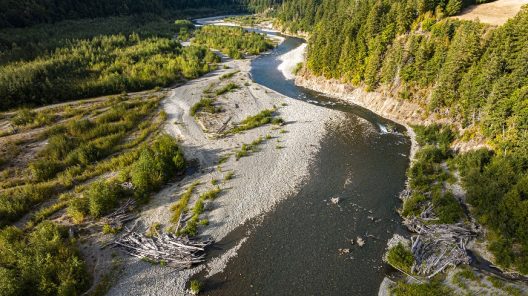Together with the School of Aquatic and Fishery Sciences, SEFS hosts the Washington Cooperative Fish and Wildlife Research Unit (WACFWRU), part of a national network of research cooperatives founded to bring federal resources to bear on state wildlife management issues. WACFWRU was founded as a fisheries research unit in 1967 and became a combined fish and wildlife research unit in 1989. The Coop Unit is a unique resource for bringing federal, state, and university partners together to address complex wildlife issues across the state of Washington, the Pacific Northwest, and beyond.
 Currently, there are 42 Cooperative Research Units in 40 states, each consisting of a partnership between the U.S. Geological Survey, a host university, one or more state agencies, and the Wildlife Management Institute. In addition to the U.S. Geological Survey and the U.S. Fish and Wildlife Service, WACFWRU cooperators include the University of Washington, Washington State University, Washington Department of Ecology, Washington Department of Fish and Wildlife, Washington Department of Natural Resources, and the Wildlife Management Institute.
Currently, there are 42 Cooperative Research Units in 40 states, each consisting of a partnership between the U.S. Geological Survey, a host university, one or more state agencies, and the Wildlife Management Institute. In addition to the U.S. Geological Survey and the U.S. Fish and Wildlife Service, WACFWRU cooperators include the University of Washington, Washington State University, Washington Department of Ecology, Washington Department of Fish and Wildlife, Washington Department of Natural Resources, and the Wildlife Management Institute.
The Unit Leader of the Coop Unit is Sarah Converse, a UW Associate Professor with appointments in SEFS and the School of Aquatic and Fishery Sciences (SAFS). She and two Assistant Unit Leaders – SEFS Assistant Professor Alex McInturff and SAFS Associate Professor Mark Scheuerell – are U.S. Geological Survey research scientists as well as UW faculty. They guide the Coop Unit in the three components of the Coop Unit’s mission. “Our mission includes training the next generation of leaders in fish and wildlife science and management, conducting research that helps agencies make decisions about fish and wildlife, and providing technical assistance to meet our state partners’ needs through activities such as providing training and participating on advisory boards,” said Converse.
With the ability to direct federal and state funds to university researchers and students and bring together cooperative partners throughout the state, region, and country, WACFWRU is a valuable resource for advancing fish and wildlife decision-making.
“This tight integration between our faculty, our students, and agency cooperators positions SEFS in the center of wildlife management and policy in the State of Washington. We are at the heart of many of the decisions that federal and state agencies are making, and I think that’s thanks to the close relationships between our faculty and students, and the agency scientists and policymakers,” said McInturff.
Graduate students within the Coop Unit are able to connect with agency scientists and conduct research that directly impacts fish and wildlife management decisions. “It’s really important to be able to be part of those conversations, to provide the best available science, and to see our work get put into action on some of the biggest issues facing the state, the region, and the country,” said McInturff.
 WACFWRU has a rich history of partnership and collaboration with the cooperating agencies that have shared research interests across Washington’s diverse ecosystems. The WACFWRU also has a long history of working beyond Washington’s borders, in the Pacific Northwest, throughout the US, and internationally.
WACFWRU has a rich history of partnership and collaboration with the cooperating agencies that have shared research interests across Washington’s diverse ecosystems. The WACFWRU also has a long history of working beyond Washington’s borders, in the Pacific Northwest, throughout the US, and internationally.
“I believe WACFWRU is a valuable asset to state agencies such as the Washington Department of Natural Resources. It is rare to have a combination of highly productive and intelligent scientists who are also down-to-earth and have a strong interest in conducting highly relevant research for managers,“ said Josh Halofsky, a cooperator with the Washington Department of Natural Resources.
Many SEFS faculty members work through the Coop Unit to produce research that addresses wildlife management needs in the state, including L. Monika Moskal, Aaron Wirsing, Beth Gardner, Josh Lawler, Brian Harvey, Laura Prugh, and Dave Butman. The projects that SEFS faculty pursue through the WACFWRU are diverse, from investigating the vulnerability of wetland habitats to climate change, to helping agencies understand how emerging infectious diseases will affect public perceptions of wildlife.
This summer, the Washington Coop Unit will introduce some new policies that will make it easier for state agencies to contract with faculty members. “We’ve been working hard on ways to streamline the contracting between the university and state agencies, and we’re looking forward to rolling out some new approaches that will improve that process,” said Converse. “We encourage agency employees and university researchers to reach out if they want to learn more about working with us.”
There are several opportunities to learn more about WACFWRU, including the bi-weekly Fish and Wildlife Ecology Seminar and the Annual Graduate Student Symposium hosted in October. You can learn more at https://depts.washington.edu/wacfwru/.


